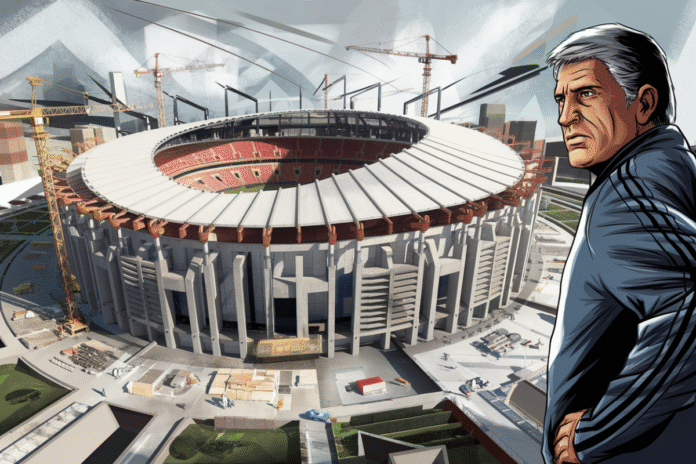“The future of one of the world’s most iconic stadiums hangs in the balance.” As Manchester United embarks on a transformative journey, the appointment of Olympic champion Lord Sebastian Coe to lead the Old Trafford Regeneration Project signals a bold move toward revitalization. This initiative comes at a critical juncture, with the stadium facing mounting pressure from fans and stakeholders for modernization and improved facilities. The project aims not only to enhance the fan experience but also to solidify the club’s status in the competitive landscape of global football.
The stakes are high for Manchester United, a club steeped in history yet challenged by recent performance issues and fan dissatisfaction. Lord Coe, renowned for his leadership and vision, brings a wealth of experience from his athletic and administrative career. His role in this regeneration effort highlights the club’s commitment to evolving with the times while honoring its rich legacy. Will this initiative successfully bridge the gap between tradition and innovation, or will it falter under the weight of expectations?
Lord Coe’s Vision for Old Trafford
Lord Sebastian Coe’s appointment is not merely symbolic; it represents a strategic shift in how Manchester United approaches its future. Coe, who famously orchestrated the London 2012 Olympics, is known for his ability to deliver large-scale projects with precision and flair. His vision for Old Trafford encompasses modern amenities, enhanced fan engagement, and sustainable practices that align with contemporary expectations. This vision is crucial as the club seeks to maintain its competitive edge in an era where fan experience is paramount.
Coe’s background in sports administration positions him uniquely to navigate the complexities of this regeneration project. Under his leadership, the focus will likely be on creating a stadium that not only serves as a venue for football but also as a community hub. This approach could include multi-use spaces that host events beyond football, thus maximizing the stadium’s potential and revenue streams. The integration of technology and sustainability will also be key components, reflecting broader trends in sports facility management.
As the project unfolds, the implications of Coe’s leadership will be closely monitored by fans and analysts alike. His ability to balance innovation with tradition will be tested, as stakeholders will demand transparency and engagement throughout the regeneration process. The success of this initiative could redefine Old Trafford, making it a model for other clubs aiming to modernize their facilities while preserving their heritage.
The Economic Impact of Regeneration
Revitalizing Old Trafford is expected to have significant economic implications for Manchester United and the surrounding community. The regeneration project aims to create jobs, boost local businesses, and attract tourism, all while enhancing the club’s financial stability. By investing in infrastructure and modern amenities, the club positions itself to increase matchday revenues and expand its global fanbase.
According to industry estimates, the economic impact of such projects can be profound. For instance, similar initiatives in other cities have resulted in increased foot traffic and spending in local businesses, creating a ripple effect that benefits the entire community. As Old Trafford undergoes transformation, the potential for job creation within construction, hospitality, and event management sectors becomes evident.
Furthermore, the project aligns with Manchester United’s broader strategy to enhance its brand value. By modernizing its facilities, the club can attract high-profile events and partnerships, leading to increased sponsorship opportunities. This financial influx is crucial as the football landscape becomes increasingly competitive, with clubs vying for lucrative broadcasting deals and commercial partnerships. The regeneration of Old Trafford could thus serve as a catalyst for Manchester United’s resurgence both on and off the pitch.
Fan Engagement and Community Involvement
Central to the Old Trafford Regeneration Project is the commitment to fan engagement and community involvement. As the club embarks on this transformative journey, it recognizes the importance of involving its supporters in the decision-making process. This approach not only fosters goodwill but also ensures that the final outcome resonates with the fanbase, which has long been a pillar of the club’s identity.
Manchester United has initiated several forums and surveys to gather input from fans regarding their expectations for the stadium’s future. This feedback loop is crucial for understanding what enhancements would most significantly impact the fan experience. From upgraded seating and improved accessibility to better hospitality options, fans have a unique opportunity to shape the regeneration process.
Moreover, the project aims to extend its impact beyond the stadium itself. By collaborating with local organizations and schools, Manchester United can engage with the community in meaningful ways. Initiatives could include educational programs, youth sports clinics, and community events that utilize the stadium as a venue for positive engagement. This holistic approach not only strengthens the bond between the club and its supporters but also reinforces its commitment to being a responsible and responsive member of the community.
The Future of Old Trafford: a New Era
As the Old Trafford Regeneration Project takes shape under Lord Coe’s leadership, the future of this iconic stadium is poised for a significant transformation. The integration of modern facilities, economic revitalization, and enhanced fan engagement presents an opportunity to redefine the matchday experience. This initiative is not merely about physical upgrades; it represents a cultural shift within Manchester United, aiming to blend tradition with innovation.
The journey ahead will undoubtedly present challenges, including balancing the desires of long-standing fans with the expectations of new supporters. However, with Coe at the helm, there is a sense of optimism that the project will be executed with the same commitment to excellence that characterized his Olympic endeavors. The successful completion of the regeneration could set a precedent for other clubs navigating similar transitions.
Ultimately, the Old Trafford Regeneration Project symbolizes a new era for Manchester United. As the club embraces change while honoring its storied past, it has the potential to emerge stronger and more connected to its community than ever before. The eyes of the football world will be watching closely as this ambitious project unfolds, marking a pivotal moment in the club’s illustrious history.


